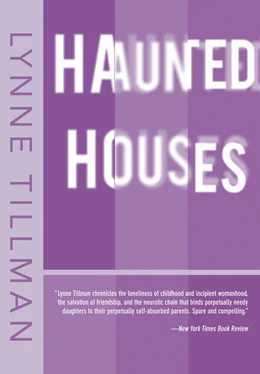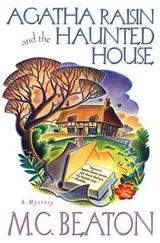Lynne Tillman - Haunted Houses
Здесь есть возможность читать онлайн «Lynne Tillman - Haunted Houses» весь текст электронной книги совершенно бесплатно (целиком полную версию без сокращений). В некоторых случаях можно слушать аудио, скачать через торрент в формате fb2 и присутствует краткое содержание. Год выпуска: 2011, Издательство: Red Lemonade, Жанр: Современная проза, на английском языке. Описание произведения, (предисловие) а так же отзывы посетителей доступны на портале библиотеки ЛибКат.
- Название:Haunted Houses
- Автор:
- Издательство:Red Lemonade
- Жанр:
- Год:2011
- ISBN:нет данных
- Рейтинг книги:5 / 5. Голосов: 1
-
Избранное:Добавить в избранное
- Отзывы:
-
Ваша оценка:
- 100
- 1
- 2
- 3
- 4
- 5
Haunted Houses: краткое содержание, описание и аннотация
Предлагаем к чтению аннотацию, описание, краткое содержание или предисловие (зависит от того, что написал сам автор книги «Haunted Houses»). Если вы не нашли необходимую информацию о книге — напишите в комментариях, мы постараемся отыскать её.
, Tillman wries of the past within the present, and of the inescapability of private memory and public history. A caustic account of how America makes and unmakes a young woman.
Haunted Houses — читать онлайн бесплатно полную книгу (весь текст) целиком
Ниже представлен текст книги, разбитый по страницам. Система сохранения места последней прочитанной страницы, позволяет с удобством читать онлайн бесплатно книгу «Haunted Houses», без необходимости каждый раз заново искать на чём Вы остановились. Поставьте закладку, и сможете в любой момент перейти на страницу, на которой закончили чтение.
Интервал:
Закладка:
Larry and Marty baked potatoes they called mickeys in fires they’d start near the East River. Their older brother Mike was a tough guy, considerably older, and involved with a fast crowd. “Murder Incorporated,” Larry told her, “but because our brother wasn’t really a member they left the family alone. There were times when we thought they were waiting for him with guns, but it wasn’t true. He just flirted with danger.” Mike used to fight with Marty and pin him to the ground, push him around, probably because Marty was Rose’s favorite. He was devoted to Rose — they all were — but Marty was more embarrassed by the way she looked. It wasn’t only that her hair was messier than other mothers’. Rose cut an eccentric figure, wearing big hats and almost stylish coats that had to have a piece of fur around the neck, all seeming to say she belonged somewhere else. She didn’t seem to care or notice what people thought. The druggist regularly dispensed to Larry 1,000-cap bottles of Dexamyl, and both he and Jane’s father kept their energy going with the help of those capsules. Larry insisted Jane see her father soon, that he missed her, even though he always yelled at her. He was hurt, Larry told her, when she wouldn’t let him into her apartment that time after he finished work. But I wasn’t expecting him, she told Larry, who declared, But he’s your father, he’s not any man.
Not any man. He is a man, the first man I knew. He was the only man for all of us, all of us women, wife, girls, daughters. Why had she written the only man for all of us. He is ugly with madness, he is beautiful with his own smell, he is different from us and he comes and goes. He eats breakfast with us. His smile is worth a million bucks. He thinks nothing of himself. Things depend upon his coming and going. He wanted sons. He contents himself with attention. He has ambition and he has no ambition. He hates himself. He hates all of us. He loves himself sometimes, he loves us sometimes. Oh, Daddy.
Chapter 11
Mark said he had nothing to hide because he wasn’t afraid of being called unnatural. Grace and he were sitting at the bar and were talking about the play Mark wanted to base on Wilde’s “The Birthday of the Infanta.” He’d changed his mind; no hospital setting, no nurse. He especially wanted to end with the fairy tale’s last line, “For the future let those who come to play with me have no heart.” “You’ve got to have something to hide,” Grace said, finishing her beer and lighting a cigarette. They agreed that Wilde was as cruel if not crueler than Poe, because of how the fairy tale begins with the preparations for the Infanta’s birthday, and how her birth killed her mother, the beautiful queen, whom the king is still mourning twelve years later. He keeps her embalmed body on display so that he can visit her once a month. “He visits her once a month like his period,” Grace laughed.
The cast of characters would include the King, the little Dwarf who doesn’t know how ugly he is, and who is brought to the palace to entertain the Infanta, the Infanta, who is the image of her mother, and as cruel as she is beautiful, the flowers who speak and the Infanta’s entourage. They can be whoever’s in the bar that night, Mark figured, wanting to give the play a kind of lived-in feeling. “Truth, beauty, beauty, truth,” he declaimed in the nearly empty bar. It was late afternoon or happy hour. Mark felt there was something really rotten at the bottom of it, and Grace agreed, feeling pretty rotten herself.
You only attack the things that give you trouble, he went on. “Trouble,” the woman three barstools from them yelled. “‘What do you know about trouble? Trouble is my middle name.” Mark peered down the bar, past this woman, to a new face, one covered by a four-day beard that gave it, this nearly ugly face, a handsome aspect, or, at least character. Men can get away with anything Grace thought, watching Mark continuing to look, and then at last walking over to him and pulling up a barstool. Up close his face was both rugged and motherly, or so it seemed to Mark, who forced himself to speak and was answered indifferently by the stranger who didn’t look up, as if he couldn’t be bothered. “I’m not interested,” he said, “I’m into pussy.” Mark excused himself, nearly falling off his seat, returning fast to Grace, wondering how he could use that in the play.
Grace told Mark her latest cat dream in which a mother cat has five kittens, very fast, in a big, messy house. The toilet has been pulled out of the bathroom and there’s nowhere to piss. A child is sleeping or dead under piles of wet clothes. There’s water everywhere and from nowhere to piss they go to “Nowhere to Run,” which was arguably the second-best Martha and the Vandellas song, after “Heat Wave.” Nowhere to run nowhere to hide and back to hiding and Mark’s definition of himself and Grace as demonstration models that would never get bought. Grace said she didn’t want to get bought, but wouldn’t mind being rented. Mark said he wanted to get married someday and so did she, because deep down there had to be that urge, waiting there like her maternal sell repressed, but ready at any moment to wear white. “Babies,” Grace snapped. “You’d be a much better mother than I would.” The way Mark saw it, the King would approach the coffin and cry out, as he did in Wilde’s story, “ Mi reina, mi reina ,” then drop to his knees weeping, after covering her embalmed face with kisses, Grace added. That would be the beginning of the play, especially since the King nearly ruined his kingdom on account of his love for her, when she was alive, and perhaps even drove him crazy, his obsession was so great. She died of his excessive demands on her, or so Mark figured, but Grace stressed that the birth of the Infanta killed her, and that’s why the King couldn’t stand the sight of his beautiful daughter. “Passion brings a terrible blindness upon its servants,” Mark quoted, and of course there’s the little Dwarf, who has never seen himself at all. And who will die of a broken heart when he does, realizing that the Infanta was only laughing at him.
Mark would’ve liked to have taken his love and locked him in a room, kept him there, thrown away the key. He would put a line into the King’s mouth: “I have set myself in agony upon your strangeness.” “Was the Queen strange?” Grace asked. “I don’t know,” Mark answered, “but it’s a play on your highness.” “Oh,” Grace said, “very funny.” Possession is nine-tenths of the law, but would the law cover Mark’s keeping his love locked away in a room in Providence. “The law doesn’t cover what you want it to cover,” he said sullenly.
Grace would be the Infanta and Mark the little Dwarf, although he toyed with playing both the King and the Dwarf. What constituted the most hideous costume and overall design for the Dwarf was under discussion. Something has to be missing. Something has to be hanging from his chin. One of his eyes must be out of the socket or blinded. He would have to have tiny hairy hands without fingernails. Dirty matted hair. Sores, running ones. An enormous nose. Or a face with no nose at all. A head much too large for its pathetic body. No proportion, Mark would play the Dwarf on his knees, like Jose Ferrer as Toulouse-Lautrec.
The woman who said trouble was her middle name was raging down the end of the bar. “You have a beautiful face, a man loves you. You have a face like a monkey, you only get screwed. Screwed. It’s better to be old. You don’t care about that. None of that. Can’t be fooled anymore.” Mark studied Grace’s face. “You’re pretty, but your nose is a little too big. You’re not perfect, there’s something just a little bit off about you.” He kept studying, and Grace said only Christ was perfect, and she didn’t mind. She also didn’t mind being called pretty, if she could use it to her advantage, although the advantages were weird. Take the Infanta. Her beauty is almost a trick. And connected to evil. “And your lower lip should be fuller,” Mark continued, “the better to beguile.” “And you’ve got too much lip,” Grace said, “it makes you lopsided. That’s what makes you perfect to play the Dwarf. But imagine if you were really ugly, with a face only a mother could love.”
Читать дальшеИнтервал:
Закладка:
Похожие книги на «Haunted Houses»
Представляем Вашему вниманию похожие книги на «Haunted Houses» списком для выбора. Мы отобрали схожую по названию и смыслу литературу в надежде предоставить читателям больше вариантов отыскать новые, интересные, ещё непрочитанные произведения.
Обсуждение, отзывы о книге «Haunted Houses» и просто собственные мнения читателей. Оставьте ваши комментарии, напишите, что Вы думаете о произведении, его смысле или главных героях. Укажите что конкретно понравилось, а что нет, и почему Вы так считаете.












